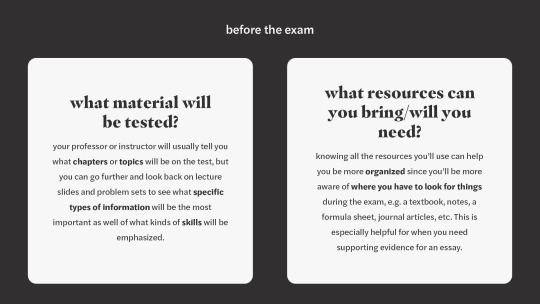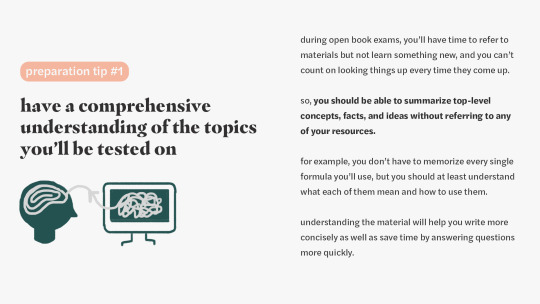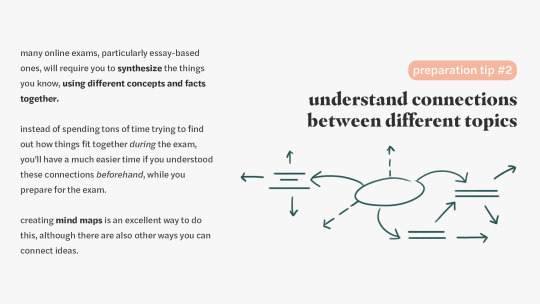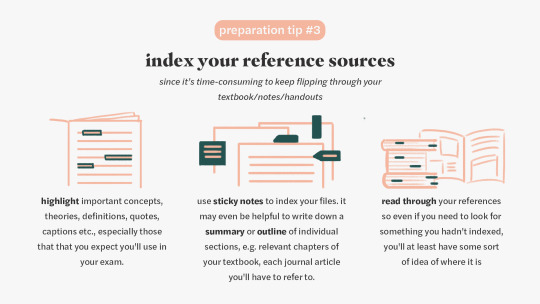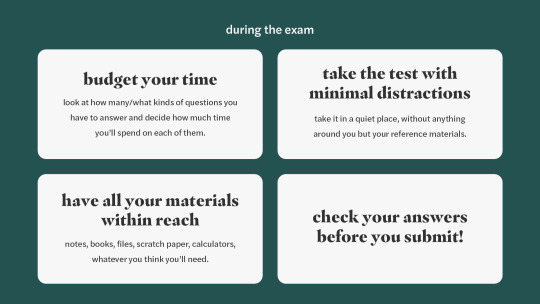If you get tired, learn to rest, not quit. If you're still tired, ask for help, it's not a weakness.
Don't wanna be here? Send us removal request.
Text
How To Digest Books Above Your “Level” And Increase Your Intelligence
10K notes
·
View notes
Text
candlelit baths are so good bc they involve all the earths elements:
fire
water
bare ass
180K notes
·
View notes
Photo
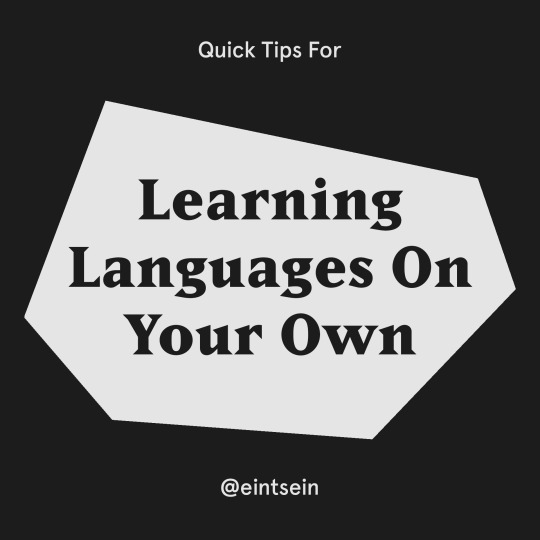
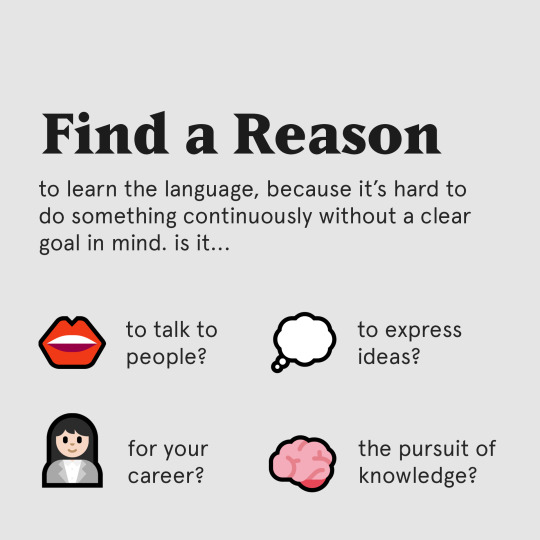
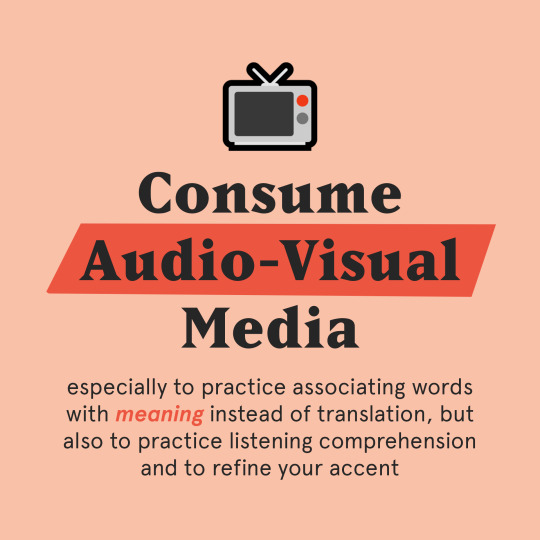

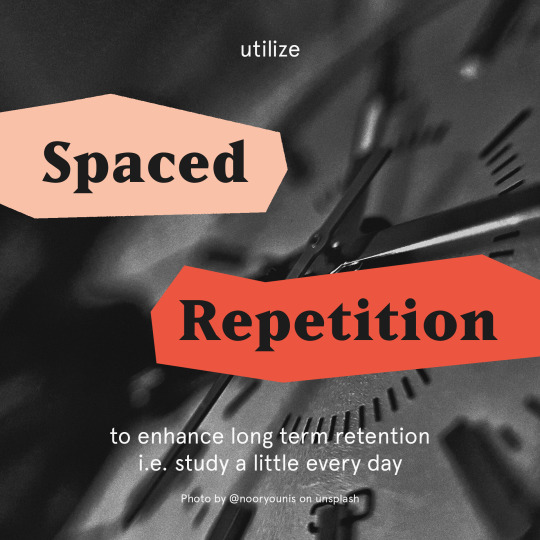


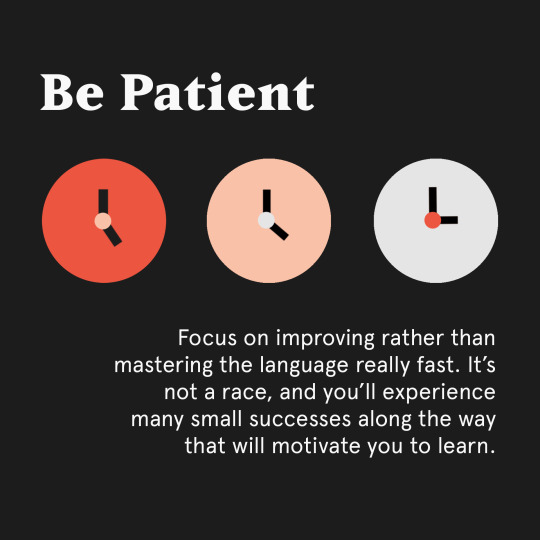
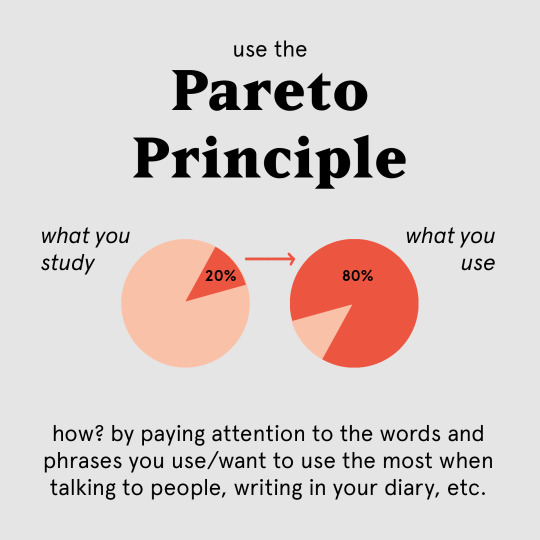
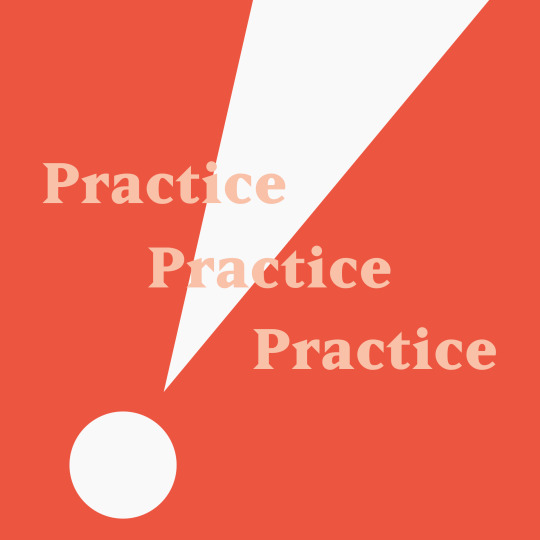
Quick Tips for Learning Languages on Your Own
Here are some mindsets and techniques that helped me study Italian on my own after classes ended. Hope this helps :)
Also, I’m trying out a new format for shorter posts–let me know what you think!
Text format below.
Keep reading
17K notes
·
View notes
Text
‘Untranslatable’ words/phrases

Culaccino - Italian
This word refers to the mark on the table that a moist glass leaves.
L'appel du vide - French
It means ‘the call of the void’, which means the urge to jump from high places like a cliff.
Fika - Swedish
Getting together to chat and take a break at home or in a café.
Tima - Icelandic
Tima means, being able to afford something but not being ready to spend money or time on it.
Jaksaa - Finnish
A lack of enthusiasm to do something.
221 notes
·
View notes
Text
Voldemort made seven encrypted backups and it still wasn’t enough
1K notes
·
View notes
Photo
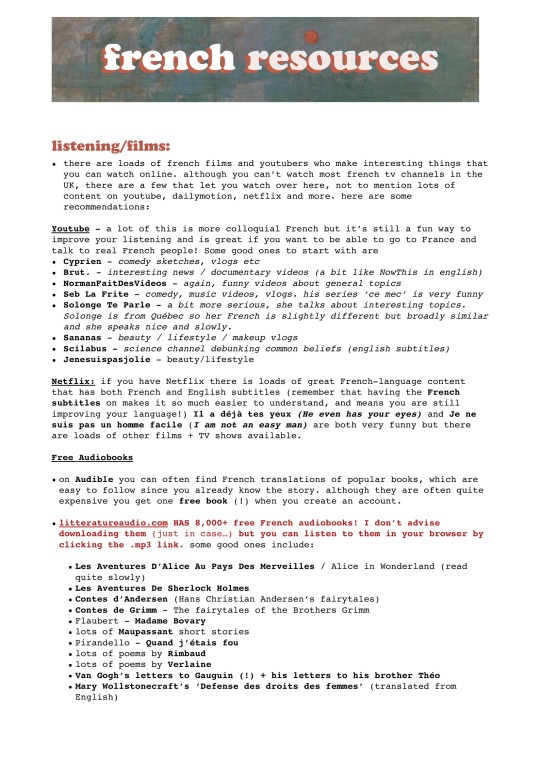
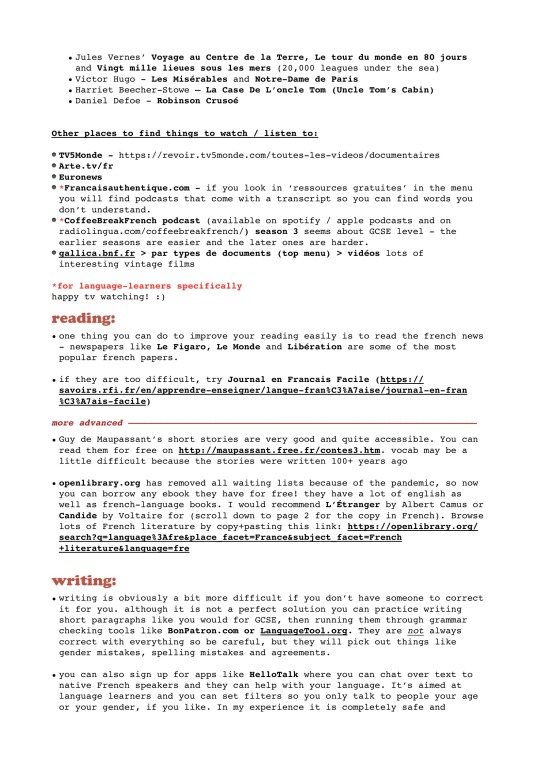
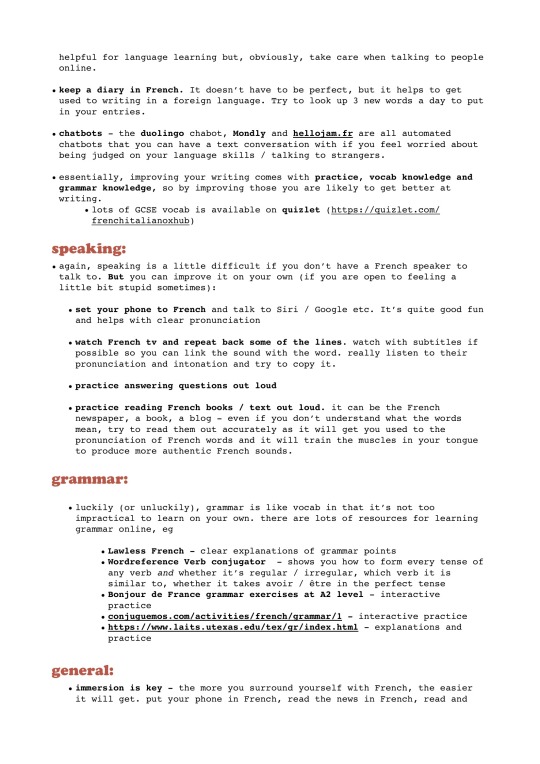

compiling some resources for all those students who have to keep up on their own <3 this was originally meant for GCSE / A2 language level but is helpful for all i think
3K notes
·
View notes
Text
The Superlinguo Linguist Job Interviews master list
The Linguist Jobs Interview series has been running for 5 years. There are now 50 interviews to date, with people who studied linguistics - be it a single undergraduate subject or a full PhD - and then gone on to careers outside of academia.
Although I ask the same questions each time, I get very different answers. For some people, linguistics is directly applicable to their daily work, while others find that the general skills they learnt can transfer to other careers.
I update this list at least once a year. For newer interviews, you can browse the Linguistics Jobs tag on the blog!
The full list of Linguistics Job Interviews (to April 2020):
Interview with a Transcriptionist
Interview with an Exhibition Content Manager
Interview with a Community Outreach Coordinator
Interview with a Marketing Content Specialist
Interview with a Software Engineer
Interview with a Product Manager
Interview with a Communications Specialist
Interview with a Learning Scientist
Interview with an Internet Linguist
Interview with a Lexicographer
Interview with a School Linguist
Interview with a Journalist
Interview with a PR Consultant
Interview with an Agency Owner & Executive Editor
Interview with a Freelance Editor, Writer and Trainer
Interview with a Language Creator
Interview with a Translator and Business Owner
Interview with a Standards Engineer
Interview with a Conductor
Interview with an Accent Coach
Interview with two Communications Professionals
Interview with a University Course Coordinator
Interview with a Think Tank Researcher
Interview with a Museum Curator
Interview with a Communications Consultant
Interview with a Linguistic Project Manager at a Language Tech Company
Interview with a Data Scientist
Interview with a Librarian
Interview with a Text Analyst
Interview with a User Experience (UX) Researcher
Interview with a Study Abroad Facilitator
Interview with The Career Linguist
Interview with a local radio Digital Managing Editor
Interview with a Senior Content Project Manager at Transparent Language
Interview with a Freelance Translator and Editor
Interview with an Apprentice Mechanic
Interview with an Educational Development Lecturer (and Linguistic Consultant)
Interview with a Client Services Manager
Interview with an English Foreign Language Teacher
Interview with a Speech Pathologist
Interview with a Computational Linguist
Interview with a Tour Company Director
Interview with a Copywriter and Brand Strategist (and Fiction Author)
Interview with a Language Revitalisation Program Director
Interview with a Media Language Researcher
Interview with an Editor and Copywriter
Interview with a Humanitarian Aid Worker
Interview with a High School Teacher
Interview with an Interpreter
Interview with a Journalist
Interview with a Data Analyst
2K notes
·
View notes
Text
Behind the Translation - “A Tale of the Frostbacks”
Una historia de la Espalda Helada - “A story from the Frostbacks”
[Note: In English, the mountains are called “Frostbacks” but in Spanish they’re called las montañas de la Espalda Helada which is more literally “the mountains of the icy-back”; a more literal translation would be la espalda de escarcha]




~
Even the mountains had a heart once [the word they use is antaño which is more literally “yesteryear”; it is commonly used as “long ago” in more flowery writing]. When the world was young, Korth, the Father of the Mountain, had his throne on the peak of Belenas, the mountain found in the center of the world, from which could be seen [the verb used is contemplar which is literally “to contemplate”, but is often used as “to behold” or “to look upon”] all the corners of the earth and sky. And he saw strong men becoming weak, brave (men) becoming cowards, and wise (men) becoming fools because of love.
Korth concocted [lit. “engineered”] a plan so that his own heart would never betray him: he pulled it out (of himself) and hid it where no soul would ever even dare to look for it. He locked it in a golden barrel, buried it, and raised around (it) the most indomitable mountains that the world had seen, those of the Frostback, to guard it [guardar which can be “to keep” or “to hold”, or “to guard”].
But, without his heart, the Mountain Father became cruel. His chest filled up with the cutting winds of the mountains, that screamed and howled like souls in anguish [la pena is usually “pain”, “anguish”, or “sorrow”; stronger than dolor “pain”]. Food lost its taste, music no longer had/held sweetness, and he forgot the happiness that displays of bravery had given him. He sent avalanches and earthquakes to torment the human tribes. Gods and men rose up against him, branding him a tyrant. But, without a heart, Korth could not be killed. Soon there were no heroes left, neither among gods nor among men, that would dare challenge the Mountain Father.
The Lady of the Skies sent her best children - the fastest, smartest, and strongest birds - to sweep the mountains in search of the vanished heart, and they [estos - meaning “these ones” literally - is often used in translation as a way to differentiate subjects; in this case they use estos to refer to the pájaros, because the verb that follows is in plural and could potentially be mistaken as applying to las montañas] searched for a year and a day. But the swallow and the crow [in English they say “raven” which is technically la corneja but in Spanish el cuervo “crow” is often used in place of it; even Edgar Allen Poe’s The Raven is translated as El Cuervo in many cases], the vulture and the eagle, the swift [el vencejo is a “swift” a kind of bird; not to be confused with the adjective veloz which is “quick/swift”] and the albatross returned with nothing.
Then, the ptarmigan [lit. la perdiz blanca which is “white partridge”, a specific species of bird] spoke and volunteered itself [lit. “offered itself (up)”] to find the heart of the lord of the gods. The rest of the birds laughed, because the ptarmigan is just a small bird, too weak to rise up in the skies, that spends half of its time hopping [lit. dar saltitos is “to give little jumps”] (around) on the ground. The Lady refused to give her blessing to the small creature because the mountains were too dangerous even for the eagle, but the ptarmigan left all the same.
The little bird entered (into) the Frostback Mountains. When it could not fly, it dragged itself (along). It embraced the ground to weather the worst winds of the mountains. And, in that way, it made its way alone into the valley where beat the heart. Due to all the terrible actions of the god, the heart weighed too much for the diminutive bird to carry it, so it rolled it [lit. “made it roll”], little by little, until it got it out of the valley and tumbled it off a cliff [lit. despeñar is “to throw off a mountain”, or “to tumble off”], and when the golden vessel struck against the earth, it broke into a thousand pieces. The heart was at the point of bursting, and the pain that flowed out of it awoke the god of the mountains, who went to see what had happened.
When Korth approached his heart, it [este; again “this one”, but used to refer to “the heart” and make it known who/what is doing the thing] leapt into his chest and the god became whole again. Then Hakkon, the Breath of Winter [in English it’s “Wintersbreath” as one word], tied the heart of Korth with three bands of iron and three bands of ice, so that it could never escape from him again. The rest of the gods revered [lit. “distinguished”] the ptarmigan even above the most majestic eagle.
32 notes
·
View notes
Text
How to learn a language when you don’t know where to start:
General Plan:
Weeks 1 and 2: Purpose:
Learn the fundamentals sentence construction
Learn how to spell and count
Start building a phrase stockpile with basic greetings
The Alphabet
Numbers 1 - 100
Subject Pronouns
Common Greetings
Conjugate the Two Most Important Verbs: to be and to have
Basic Definite and Indefinite Articles
Weeks 3 and 4: Purpose:
Learn essential vocabulary for the day-to-day
Start conjugating regular verbs
Days of the Week and Months of the Year
How to tell the time
How to talk about the weather
Family Vocabulary
Present Tense Conjugations Verbs
Weeks 5 and 6: Purpose:
Warm up with the last of the day-to-day vocabulary
Add more complex types of sentences to your grammar
Colours
House vocabulary
How to ask questions
Present Tense Conjugations Verbs
Forming negatives
Weeks 7 and 8: Purpose:
Learn how to navigate basic situations in a region of your target language country
Finish memorising regular conjugation rules
Food Vocabulary and Ordering at Restaurants
Money and Shopping Phrases
Present Tense Conjugations Verbs
Weeks 9 and 10: Purpose:
Start constructing descriptive and more complex sentences
Adjectives
Reflective verbs
Places vocabulary
Weeks 11 and 12: Purpose:
Add more complex descriptions to your sentences with adverbs
Wrap up vocabulary essentials
Adverbs
Parts of the body and medical vocabulary
Tips for Learning a Foreign Language:
Learning Vocabulary:
What vocabulary should I be learning?
There are hundreds of thousands of words in every language, and the large majority of them won’t be immediately relevant to you when you’re starting out.Typically, the most frequent 3000 words make up 90% of the language that a native speaker uses on any given day. Instead try to learn the most useful words in a language, and then expand outwards from there according to your needs and interests.
Choose the words you want/need to learn.
Relate them to what you already know.
Review them until they’ve reached your long-term memory.
Record them so learning is never lost.
Use them in meaningful human conversation and communication.
How should I record the vocabulary?
Learners need to see and/or hear a new word of phrase 6 to 17 times before they really know a piece of vocabulary.
Keep a careful record of new vocabulary.
Record the vocabulary in a way that is helpful to you and will ensure that you will practice the vocabulary, e.g. flashcards.
Vocabulary should be organised so that words are easier to find, e.g. alphabetically or according to topic.
Ideally when noting vocabulary you should write down not only the meaning, but the grammatical class, and example in a sentence, and where needed information about structure.
How should I practice using the vocabulary?
Look, Say, Cover, Write and Check - Use this method for learning and remembering vocabulary. This method is really good for learning spellings.
Make flashcards. Write the vocabulary on the front with the definition and examples on the back.
Draw mind maps or make visual representations of the new vocabulary groups.
Stick labels or post it notes on corresponding objects, e.g when learning kitchen vocabulary you could label items in your house.
How often should I be practising vocabulary?
A valuable technique is ‘the principle of expanding rehearsal’. This means reviewing vocabulary shortly after first learning them then at increasingly longer intervals.
Ideally, words should be reviewed:
5-10 minutes later
24 hours later
One week later
1-2 months later
6 months later
Knowing a vocabulary item well enough to use it productively means knowing:
Its written and spoken forms (spelling and pronunciation).
Its grammatical category and other grammatical information
Related words and word families, e.g. adjective, adverb, verb, noun.
Common collocations (Words that often come before or after it).
Receptive Skills: Listening and Reading
Reading is probably one of the most effective ways of building vocabulary knowledge.
Listening is also important because it occupies a big chunk of the time we spend communicating.
Tips for reading in a foreign language:
Start basic and small. Children’s books are great practice for beginners. Don’t try to dive into a novel or newspaper too early, since it can be discouraging and time consuming if you have to look up every other word.
Read things you’ve already read in your native language. The fact that you at least know the gist of the story will help you to pick up context clues, learn new vocabulary and grammatical constructions.
Read books with their accompanying audio books. Reading a book while listening to the accompanying audio will improve your “ear training”. It will also help you to learn the pronunciation of words.
Tips for listening in a foreign language:
Watch films in your target language.
Read a book while also listening along to the audio book version.
Listen to the radio in your target language.
Watch videos online in your target language.
Activities to do to show that you’ve understood what you’ve been listening to:
Try drawing a picture of what was said.
Ask yourself some questions about it and try to answer them.
Provide a summary of what was said.
Suggest what might come next in the “story.”
Translate what was said into another language.
“Talk back” to the speaker to engage in imaginary conversation.
Productive Skills: Speaking and Writing
Tips for speaking in a foreign language:
If you can, try to speak the language every day either out loud to yourself or chat to another native speaker whether it is a colleague, a friend, a tutor or a language exchange partner.
Write a list of topics and think about what you could say about each one. First you could write out your thoughts and then read them out loud. Look up the words you don’t know. You could also come up with questions at the end to ask someone else.
A really good way to improve your own speaking is to listen to how native speakers talk and imitate their accent, their rhythm of speech and tone of voice. Watch how their lips move and pay attention to the stressed sounds. You could watch interviews on YouTube or online news websites and pause every so often to copy what you have just heard. You could even sing along to songs sung in the target language.
Walk around the house and describe what you say. Say what you like or dislike about the room or the furniture or the decor. Talk about what you want to change.This gets you to practise every day vocabulary.
Tips for writing in a foreign language:
Practice writing in your target language. Keep it simple to start with. Beginner vocabulary and grammar concepts are generally very descriptive and concrete.
Practice writing by hand. Here are some things you can write out by hand:
Diary entries
Shopping lists
Reminders
What could I write about?
Write about your day, an interesting event, how you’re feeling, or what you’re thinking.
Make up a conversation between two people.
Write a letter to a friend, yourself, or a celebrity. You don’t need to send it; just writing it will be helpful.
Translate a text you’ve written in your native language into your foreign language.
Write a review or a book you’ve recently read or a film you’ve recently watched.
Write Facebook statuses, Tweets or Tumblr posts (whether you post them or not will be up to you).
Write a short story or poem.
Writing is one of the hardest things to do well as a non-native speaker of a language, because there’s no room to hide.
There are lots of ways to improve your writing ability, but they can be essentially boiled down to three key components:
Read a lot
Write a lot
Get your writing corrected
28K notes
·
View notes
Text
“We operate all the time with language as if it says what we mean. It never does, but you don’t realize the flaccidity of that until you are actually trying to make one thing in one language into another language. It’s like being on the surface with a lot of cracks in it and looking down through the cracks to something like another world down there that you can almost see, almost express, but not quite.”
— Anne Carson, in an interview with Eleanor Watchel for Writers & Company
4K notes
·
View notes
Text
my quick tips for working / studying from home
- get dressed and style your hair as if you’re going to school/work - even use the same perfume/ cologne as you normally do (trick your mind into being motivated)
- plan things out - everything (plan out your week, day, meal, etc. you can make these as specific as you’d like. this will help you stay on top of your work as well as stay healthy, especially if you live alone.)
- make studying/ working the first thing you do each day - best if you can start in the morning (minimize the tendency to procrastinate)
- just start - don’t worry too much about perfecting or finishing anything yet (if you don’t start then there’s nothing for you to perfect or get done. and it will never get done)
- listen to old and simple (aka non-distracting) podcasts, Youtube videos, or café/ chattering white-noise, etc. simply leave them as background noise to create an illusion of being outside your room (bring the presence of people to you. my favorites lately have been slam poems from 2016, Mae Martin’s stages, and Awsten Knight’s crackhead podcasts)
- set timers, for both study sessions and breaks (so that you don’t overwork, burn out, or procrastinate. the Pomodoro technique works great here)
- take advantage of the comfort of your own home (light a candle, have crunchy snacks, play loud music, review notes out loud while pacing around, wrap yourself in a blanket burrito, study on your bed if you can focus there like me, etc. basically anything you can’t do in a classroom, office, or the library)
- if you miss your friends, call/ text/ facetime them, make a study group chat with them, etc. (that is what technology is for)
- choose recreational activities/ self-care for your breaks instead of going on social media (go on walks, make small art, play an instrument, stretch, take a nap, etc. I usually reach for my guitar, brainstorm writing ideas, or sketch very simple line art.)
- if you want to go on social media, do it during meal times - or the 15 minutes after your meals that you can’t work just yet (it also doesn’t make you feel like you’re wasting time)
- study in different rooms for a change of scenery (dining room, living room, the patio, etc. I have an armchair next to the window that I study in whenever I need some sunlight and don’t have to write anything down. however, if you need a designated place to focus on your work, you can also use these alternative spaces as designated “relax” or “creative” place for your breaks)
- use this as an opportunity to take care of yourself (get enough sleep, drink water, exercise, talk to your family, take your meds, be mindful of your mental health, etc.)
Feel free to add your tips. The current situation sure is unpleasant but it is unavoidable. All we can really do now is take care of ourselves, others, and try to make the best out of this.
Good luck to everyone and stay safe! My heart is with you all 💕
13K notes
·
View notes
Link
47 notes
·
View notes
Link
The most useful part of this article is the table. I did research to find the highest quality language learning apps out there, all the languages they offer, the cost, etc. So you can search for a language you want to learn and the table will filter results based on what’s available for your target language!
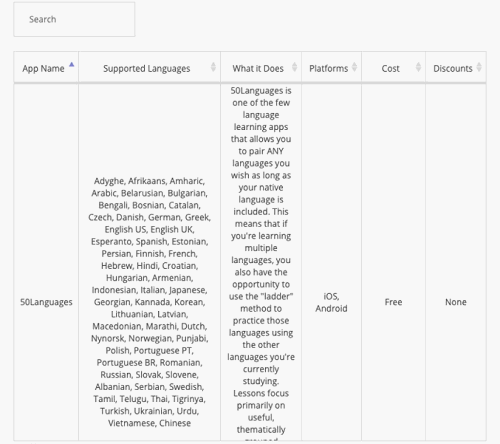
1K notes
·
View notes
Text
How to learn a language when you don’t know where to start:
General Plan:
Weeks 1 and 2: Purpose:
Learn the fundamentals sentence construction
Learn how to spell and count
Start building a phrase stockpile with basic greetings
The Alphabet
Numbers 1 - 100
Subject Pronouns
Common Greetings
Conjugate the Two Most Important Verbs: to be and to have
Basic Definite and Indefinite Articles
Weeks 3 and 4: Purpose:
Learn essential vocabulary for the day-to-day
Start conjugating regular verbs
Days of the Week and Months of the Year
How to tell the time
How to talk about the weather
Family Vocabulary
Present Tense Conjugations Verbs
Weeks 5 and 6: Purpose:
Warm up with the last of the day-to-day vocabulary
Add more complex types of sentences to your grammar
Colours
House vocabulary
How to ask questions
Present Tense Conjugations Verbs
Forming negatives
Weeks 7 and 8: Purpose:
Learn how to navigate basic situations in a region of your target language country
Finish memorising regular conjugation rules
Food Vocabulary and Ordering at Restaurants
Money and Shopping Phrases
Present Tense Conjugations Verbs
Weeks 9 and 10: Purpose:
Start constructing descriptive and more complex sentences
Adjectives
Reflective verbs
Places vocabulary
Weeks 11 and 12: Purpose:
Add more complex descriptions to your sentences with adverbs
Wrap up vocabulary essentials
Adverbs
Parts of the body and medical vocabulary
Tips for Learning a Foreign Language:
Learning Vocabulary:
What vocabulary should I be learning?
There are hundreds of thousands of words in every language, and the large majority of them won’t be immediately relevant to you when you’re starting out.Typically, the most frequent 3000 words make up 90% of the language that a native speaker uses on any given day. Instead try to learn the most useful words in a language, and then expand outwards from there according to your needs and interests.
Choose the words you want/need to learn.
Relate them to what you already know.
Review them until they’ve reached your long-term memory.
Record them so learning is never lost.
Use them in meaningful human conversation and communication.
How should I record the vocabulary?
Learners need to see and/or hear a new word of phrase 6 to 17 times before they really know a piece of vocabulary.
Keep a careful record of new vocabulary.
Record the vocabulary in a way that is helpful to you and will ensure that you will practice the vocabulary, e.g. flashcards.
Vocabulary should be organised so that words are easier to find, e.g. alphabetically or according to topic.
Ideally when noting vocabulary you should write down not only the meaning, but the grammatical class, and example in a sentence, and where needed information about structure.
How should I practice using the vocabulary?
Look, Say, Cover, Write and Check - Use this method for learning and remembering vocabulary. This method is really good for learning spellings.
Make flashcards. Write the vocabulary on the front with the definition and examples on the back.
Draw mind maps or make visual representations of the new vocabulary groups.
Stick labels or post it notes on corresponding objects, e.g when learning kitchen vocabulary you could label items in your house.
How often should I be practising vocabulary?
A valuable technique is ‘the principle of expanding rehearsal’. This means reviewing vocabulary shortly after first learning them then at increasingly longer intervals.
Ideally, words should be reviewed:
5-10 minutes later
24 hours later
One week later
1-2 months later
6 months later
Knowing a vocabulary item well enough to use it productively means knowing:
Its written and spoken forms (spelling and pronunciation).
Its grammatical category and other grammatical information
Related words and word families, e.g. adjective, adverb, verb, noun.
Common collocations (Words that often come before or after it).
Receptive Skills: Listening and Reading
Reading is probably one of the most effective ways of building vocabulary knowledge.
Listening is also important because it occupies a big chunk of the time we spend communicating.
Tips for reading in a foreign language:
Start basic and small. Children’s books are great practice for beginners. Don’t try to dive into a novel or newspaper too early, since it can be discouraging and time consuming if you have to look up every other word.
Read things you’ve already read in your native language. The fact that you at least know the gist of the story will help you to pick up context clues, learn new vocabulary and grammatical constructions.
Read books with their accompanying audio books. Reading a book while listening to the accompanying audio will improve your “ear training”. It will also help you to learn the pronunciation of words.
Tips for listening in a foreign language:
Watch films in your target language.
Read a book while also listening along to the audio book version.
Listen to the radio in your target language.
Watch videos online in your target language.
Activities to do to show that you’ve understood what you’ve been listening to:
Try drawing a picture of what was said.
Ask yourself some questions about it and try to answer them.
Provide a summary of what was said.
Suggest what might come next in the “story.”
Translate what was said into another language.
“Talk back” to the speaker to engage in imaginary conversation.
Productive Skills: Speaking and Writing
Tips for speaking in a foreign language:
If you can, try to speak the language every day either out loud to yourself or chat to another native speaker whether it is a colleague, a friend, a tutor or a language exchange partner.
Write a list of topics and think about what you could say about each one. First you could write out your thoughts and then read them out loud. Look up the words you don’t know. You could also come up with questions at the end to ask someone else.
A really good way to improve your own speaking is to listen to how native speakers talk and imitate their accent, their rhythm of speech and tone of voice. Watch how their lips move and pay attention to the stressed sounds. You could watch interviews on YouTube or online news websites and pause every so often to copy what you have just heard. You could even sing along to songs sung in the target language.
Walk around the house and describe what you say. Say what you like or dislike about the room or the furniture or the decor. Talk about what you want to change.This gets you to practise every day vocabulary.
Tips for writing in a foreign language:
Practice writing in your target language. Keep it simple to start with. Beginner vocabulary and grammar concepts are generally very descriptive and concrete.
Practice writing by hand. Here are some things you can write out by hand:
Diary entries
Shopping lists
Reminders
What could I write about?
Write about your day, an interesting event, how you’re feeling, or what you’re thinking.
Make up a conversation between two people.
Write a letter to a friend, yourself, or a celebrity. You don’t need to send it; just writing it will be helpful.
Translate a text you’ve written in your native language into your foreign language.
Write a review or a book you’ve recently read or a film you’ve recently watched.
Write Facebook statuses, Tweets or Tumblr posts (whether you post them or not will be up to you).
Write a short story or poem.
Writing is one of the hardest things to do well as a non-native speaker of a language, because there’s no room to hide.
There are lots of ways to improve your writing ability, but they can be essentially boiled down to three key components:
Read a lot
Write a lot
Get your writing corrected
28K notes
·
View notes
Text
How to insult your Best Friend by text in French 🇫🇷
Okay so obviously guys these words are just the ways me and my best friend insult each other, it’s not how all friendships insult each other but let’s say that I believe that the stronger the insult the stronger the friendship so HERE YOU GO
Sale/Ptite Pute
This means “dirty/little bitch”, ptite is “petite” but written the way we would pronounce it in fluent French


Convo 1: Play scrabble dirty bitch
Convo 2: Don’t play with my heart little bitch
Tchoin
A bitch also, once again and I have no clue where that comes from tbh
Convo: no you bitch

Salope
Aaaand that’s just another way to say “bitch” lol
Convo: No you’re not allowed it’s a bee bitch

533 notes
·
View notes
Photo

Hey, I thought I would compile a selection of different resources dedicated to learning the Russian language. Feel free to reblog and add your own
Information about the language
Russian Language on Wikipedia
Russian Language on BBC
Russian Language on Encyclopaedia Britannica
Russian Language on Real Russia
Books
I have a masterlist of different Russian language textbooks for all levels, as well as general Russian literature and Russian magazines for reading practice. It contains over 60,000 books and over 4,000 magazines
Children’s Books in Russian
Project Gutenberg Free Russian Books
Courses - Note that not all of these courses are free.
Lingvist (comes with a 2-week free trial, and by far my favourite course)
Duolingo (Joining with this link automatically adds me as a friend)
Busuu
I Kinda Like Languages Russian Course
Learn Russian with RT (The audio files no longer work but there’s a lot of great resources that work)
Live Lingua Russian Tutors (Not a course as such, but a way to get a Tutor. You can get a free hour lesson)
Russian for Everyone
Russian for Free
RussianLessons
Russian Made Easy
Way To Russia
Russky
Lingodeer
Между нами
MasterRussian
Я говорю по-русски/ I speak Russian
Русский как иностранный: B1+. Russian as a foreign language: B1+
Русский как иностранный: B1+. Часть 2. Russian as a foreign language. B1+. Part 2.
Русский как иностранный B2-1 / Russian As a Foreign Language B2-1
Русский язык как иностранный B2-2 / Russian as a Foreign Language B2-2
A1 Elementary Russian Course with Pushkin Institute
A2 Basic Russian Course with Pushkin Institute
B1 I Certified Russian Course with Pushkin Institute
B2 II Certified Russian Course with Pushkin Institute
C1 III Certified Russian Course with Pushkin Institute
C2 IV Certified Russian Course with Pushkin Institute
Beginner Russian Course / Курс России языка для начинающих
Intermediate Russian Course / Курс России языка среднего уровня
Russian Grammar Course / Курс грамматики России языка
Russian Course for Travelers / Курс России языка для путешественников
From Zero to Fluency Youtube Course
Start Speaking Russian Youtube Course
Russian Reading Youtube Course
Learn Russian Alphabet
Russian (Kazakhstan) Peace Corps Course
FSI Russian Course
Learn Russian
Yes Russian
Polymath
Learnalanguage
Ready Russian
Simplang
Russian Learning Reddit
Learn With Oliver
Memrise is a great resource as it has Memrise courses and user-created courses. These are the official Russian courses if you go through them one by one they amount to approximately 54 hours of content. The thing I like about Memrise is they test you on your pronunciation, and they have lots of videos by Russian native speakers. So it really tests you in all your skills.
Russian 1 by Memrise
Russian 2 by Memrise
Russian 3 by Memrise
Russian 4 by Memrise
Russian 5 by Memrise
Russian 6 by Memrise
Russian 7 by Memrise
These are some unofficial Russian Memrise courses you might like too. Although they tend to not have audio and they don’t have pronunciation tests or native speaker videos, they can still be a good resource.
Learn Basic Russian
Top 10,000 words part one
Top 10,000 words part two
Russian Grammar through Exercises
Assimil Russian
New Penguin Russian Course Vocabulary
Vocabulary resources
Anki
Word Reference
Ba Ba Dum
L-Lingo
Russian Swadesh list
English terms derived from Russian
Wikipedia Russian Topics (Click on different topics then click on different words for their English translation and meaning)
Russian Idioms
Russian Proverbs
Russian Similies
20,000-word Frequency dictionary of the modern Russian language (the Russian National Corpus)
Russian spelling alphabet
Russian Frequency lists/1-1000
Russian Frequency lists/1001-2000
Russian Frequency lists/2001-3000
Russian Frequency lists/3001-4000
Russian Frequency lists/4001-5000
Russian Adjectives - Frequency List
Russian Nouns - Frequency List
Russian Verbs - Frequency List
Russian palindromes
Russian Pronouns
Alpha Dictionary
Dubbed Russian Songs (Russian songs with Russian lyrics alongside transliteration and English translation. They also accept requests)
Clozemaster (I’d say this is more for intermediate-advanced, but beginners might make use of this as well)
Vikida Children’s Encyclopedia (Entirely in Russian)
Russian for Children by Pushkin Institute (Entirely in Russian) This actually contains resources for 5+ to 18+ so it covers a broad range of levels
Slow Russian Podcast
Slow Russian Youtube
Beginning Russian through Film
Amazing Russian Youtube
Bab.La English - Russian Dictionary
Grammar
Grammar Exercises Youtube Playlist
MasterRussian
Online Interactive Grammar
Learn Russian Grammar Tables
Russian Grammar Youtube
Russificate
Conjugation Tool
Russian Grammar
Russian News Sites
Russia Today (In Russian) / Russia Today (in English) (They also have a whole database of documentaries/shows/films that are in English or Russian. Just click on a show here and it’ll give you the option to watch in English or Russian)
The Moscow Times (In Russian) / The Moscow Times (In English) (They have free English PDFs of past print publications too)
Tass Russian News Agency (In Russian) / Tass Russian News Agency (In English)
Moskovskij Komsomolets (Московский комсомолец) (only available in Russian)
Komsomolskaya Pravda (Комсомо́льская пра́вда) (only available in Russian)
Izvestia (ɪzˈvʲestʲɪjə) (Only available in Russian)
Rossiyskaya Gazeta (Российская газета) (Only available in Russian)
Kommersant (Коммерса́нтъ) (Only available in Russian)(There is also a UK news website entirely in Russian)
Trud (Tpyд) (Only available in Russian)
Moskovskiye Novosti (Московские новости) (Only available in Russian)
Nezavisimaya Gazeta (Независимая газета) (Only available in Russian)
Novye Izvestia (Новые Известия) (Only available in Russian)
Vedomosti (Ведомости) (Only available in Russian)
Pravda Правда (Only available in Russian)
Delovoy Peterburg Деловой Петербург (Only available in Russian)
RBC daily (Only available in Russian)
Sport Express (Спорт-Экспресс) (Only available in Russian)
Sovetsky Sport (Советский спорт) (Only available in Russian)
Russia Beyond The Headlines (In Russian) / Russia Beyond The Headlines (In English)
Krasnaya Zvezda (Кра́сная звезда́) (Only available in Russian)
Moskovskaya Pravda (Московская правда) (Only available in Russian)
Argumenty i Fakty (Аргументы и факты) (Only available in Russian)
Sovetsky Sakhalin (Советский Сахалин) (Only available in Russian)
Tyumenskaya Oblast Segodnya (Only available in Russian)
Vecherniy Murmansk (Вечерний Мурманск) (Only available in Russian)
Vecherniy Novosibirsk (Вечерний Новосибирск) (Only available in Russian)
Vecherniy Stavropol (Вечерний Ставрополь) (Only available in Russian)
Novaya Gazeta (Новая газета) (Only available in Russian)
Novgorod (Новгород) (Only available in Russian)
Sankt-Peterburgskie Vedomosti (Санкт-Петербургские ведомости) (Only available in Russian)
Literaturnaya Gazeta (Литературная газета) (Only available in Russian)
Parlamentskaia Gazeta (Парламентская газета) (Оnly available in Russian)
Meduza (In Russian) / Meduza (In English)
Please note that sites listed do not equal an endorsement. I don’t know the political background or views of each of these publications. I’m merely compiling a variety I saw through various Russian news lists and search engine results. Content warnings may apply and not all content may be suitable for minors
Listening practice (Note, I may make another masterlist compiling various Russian podcasts and Youtube channels so I’m leaving them out of this section)
LibriVox
Listeningpractice.org
Slavic Languages and Cultures Department, University of Groningen Listen to the Slavic languages
Audio Lingua
Learn Russian with Peppa Pig
Forvo
StarMediaEN (Russian shows, documentaries etc with English subtitles)
Russian Films With English Subtitles Youtube Playlist
Alosha (Алёша Попович и Тугарин Змей) Children’s Film
Dobrynya and the Dragon (Добрыня Никитич и Змей Горыныч) Children’s Film
Ilya Muromets and Sparrow the Robber (Илья Муромец и Соловей Разбойник) Children’s film
How Not to Rescue a Princess (Три Богатыря и Шамаханская Царица) Children’s Film
Russian Animation (Mixture of dubbed content and subtitled content)
Киноконцерн “Мосфильм” (Moscow Film, only some of these are subtitled)
фильмы о Холмсе и ��атсоне (Movies about Sherlock Holmes with Russian audio and English subtitles)
Okay, so this list has gotten long enough lol. If you have any resources you feel should be added feel free to reblog and add them or message me and I’ll edit it in. If you have any requests for resource compilations that you want me to do (e.g. compiling Russian podcasts, general Russian websites, Russian YouTubers etc) please let me know.
948 notes
·
View notes


